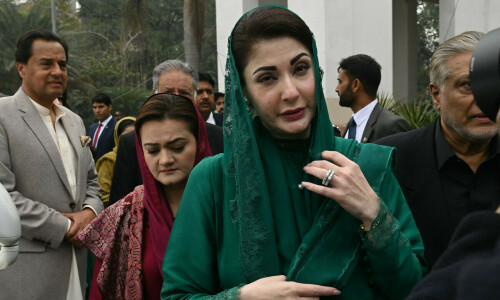ISLAMABAD : President Dr Arif Alvi praised the media on Friday for its role in the struggle to safeguard democracy and for pinpointing bad governance.
“We believe in freedom of the press, but we also believe in responsibility of the press — that nobody can dilute,” he said in an address to a convention on “Media and Democracy”, organised by the Council of Pakistan Newspaper Editors (CPNE). Office-bearers of the CPNE, in their speeches, criticised the government for coming up with fresh rules and regulations to suppress free speech.
Dr Alvi replied that there were only two ways to counter “irresponsible content”. “The best option is self-regulation — the other is government regulation. At the same time unaccountable freedom is not good either while too much government control and managing media over sensitive issues will not work,” the president said.
Dr Alvi said the CPNE should discuss problems faced by the print media with the government to work out a solution. He called upon the electronic media to highlight social and health issues like malnutrition, stunting of children, and lack of inheritance rights to almost 90 per cent of women in the country.
He hinted at instituting awards for media outlets that allocate maximum space to public service messages.
Information Minister Fawad Chaudhry said the government wanted to know the causes behind the financial woes afflicting the media. “The federal government has given advertisements worth Rs300 — 350 million in one month, but even then media houses are going ahead with retrenchments. We all need to know what are the reasons for this financial crunch.” He said the situation had proved that sustainability of media industry was dependent on the economy and asked CPNE to support the government in its efforts to attract investment and make the country business-friendly. “Newspapers and channels opposing Basant are not doing any service to the nation other than driving off tourists and investments,” he added.
During previous sessions the convention saw discussions on the future of print and electronic media. with experts observing that media houses should chart out a strategy to survive amid the growth of digital media.
The consensus was that digital technology was the most effective tool to differentiate between fake news and correct news. During interactive sessions most of the speakers criticised the government for “pressures on media” and the idea of establishing a media regulatory authority.
Among others who spoke were Arif Nizami, the CPNE president, and general secretary Abdul Jabbar Khattak.
Mr Nizami said the government should come up with an effective policy to prop up the media in these difficult times. He complained that advertisements were not given on merit in the past. He said for the first time in the country’s history, “silent gags” had been imposed and certain anchors were not being allowed to conduct their shows. Likewise, certain newspapers were facing hurdles in distribution.
Zaffar Abbas, the Editor of Dawn, said the “editor’s institution” needed to be strengthened, urging the CPNE to take up the matter on a priority basis.
Veteran journalist M. Ziauddin said journalists should not treat ethical issues lightly because “credibility matters”. He criticised the establishment for “interference”, citing the Dawn leaks saga as an example.
“Dawn leaks was a watershed as certain media houses opted to be pitted against fellow journalists.”
President Arif Alvi gave lifetime achievement awards to veteran journalists Mehmoodul Aziz, Yousuf Shaheen, Abid Sanaullah, Anwar Sajidi, Zia Shahid, Ajmal Dehlavi and M. Ziauddin.
Published in Dawn, January 19th, 2019














































Dear visitor, the comments section is undergoing an overhaul and will return soon.